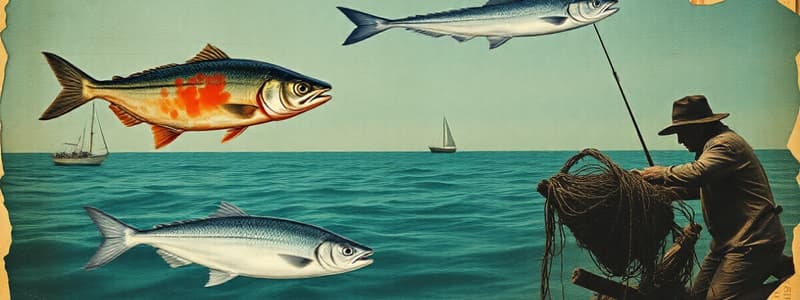Podcast
Questions and Answers
What percentage of the oxygen we breathe is estimated to come from marine phytoplankton?
What percentage of the oxygen we breathe is estimated to come from marine phytoplankton?
- 10% to 30%
- 50% to 85% (correct)
- 20% to 40%
- 60% to 80%
Which fishing method is associated with the highest level of bycatch?
Which fishing method is associated with the highest level of bycatch?
- Spearfishing
- Fly fishing
- Longline fishing (correct)
- Trap fishing
What environmental issue is caused by bottom trawling?
What environmental issue is caused by bottom trawling?
- Destruction of seafloor habitats (correct)
- Ocean acidification
- Overfishing of specific species
- Increase in plankton populations
How many whales, dolphins, seals, sea lions, and turtles are estimated to be killed each year due to the fishing industry?
How many whales, dolphins, seals, sea lions, and turtles are estimated to be killed each year due to the fishing industry?
Why is longline fishing potentially harmful to sharks?
Why is longline fishing potentially harmful to sharks?
What is a significant consequence of the methods used in wild fish fishing?
What is a significant consequence of the methods used in wild fish fishing?
How long can longlines used in fishing be?
How long can longlines used in fishing be?
Why are oil spills in the ocean particularly alarming?
Why are oil spills in the ocean particularly alarming?
What percentage of fish caught is estimated to be bycatch?
What percentage of fish caught is estimated to be bycatch?
What has been the increase in the number of overfished species in the past 40 years?
What has been the increase in the number of overfished species in the past 40 years?
What is one consequence of farmed fish requiring smaller fish for food?
What is one consequence of farmed fish requiring smaller fish for food?
Which type of habitat destruction is primarily linked to shrimp farming?
Which type of habitat destruction is primarily linked to shrimp farming?
What percentage of the world's fisheries are indicated to be overexploited or fully exploited?
What percentage of the world's fisheries are indicated to be overexploited or fully exploited?
What is the estimated weight ratio of ocean fish needed to produce one pound of farmed salmon?
What is the estimated weight ratio of ocean fish needed to produce one pound of farmed salmon?
What significant environmental issue arises from fish farming waste?
What significant environmental issue arises from fish farming waste?
What percentage of macroplastics found in the Great Pacific Garbage Patch is attributed to fishing nets?
What percentage of macroplastics found in the Great Pacific Garbage Patch is attributed to fishing nets?
What is a result of overcrowding in aquaculture facilities?
What is a result of overcrowding in aquaculture facilities?
What is one major consequence of the destruction of mangroves mentioned in the content?
What is one major consequence of the destruction of mangroves mentioned in the content?
Flashcards are hidden until you start studying
Study Notes
The Environmental Impact of Fish Consumption
- Oceans produce 50-85% of the oxygen we breathe via marine phytoplankton.
- 70% of the Earth's surface is water, but less than 10% of the ocean has been explored.
- 50-80% of all life is estimated to live under the ocean surface.
Fishing Methods and Bycatch
- Bottom trawling drags nets across the seafloor, causing habitat damage and massive bycatch.
- Longline fishing uses extremely long lines with baited hooks, resulting in substantial bycatch.
- Annually, the fishing industry kills approximately 650,000 whales, dolphins, seals, sea lions, and turtles (more than one per minute).
- An estimated 50 million sharks are unintentionally caught as bycatch each year.
- 10-40% of all fish caught are bycatch.
- The fishing industry has caused a 60% decline in shark numbers in Costa Rican waters (according to researcher Randall Arauz).
- One-third of caught fish are used to feed farmed animals (including other fish, pigs, and chickens).
Overfishing and the State of Fisheries
- The number of overfished species has tripled in the last 40 years.
- 87% of the world's fisheries are overexploited or fully exploited (UN FAO).
- Nearly one-third of edible fish and seafood species have declined by 90%.
- A study predicted fishless oceans by 2048.
- 70% of macroplastics in the ocean are fishing-related.
- 86% of macroplastics in the Great Pacific Garbage Patch are fishing nets.
The Environmental Impact of Farmed Fish
- Farmed fish now account for around half of global fish consumption.
- Many farmed fish are carnivores, requiring large quantities of wild fish as feed (e.g., 5 pounds of ocean fish for 1 pound of farmed salmon).
- Overcrowding in aquaculture leads to disease and high antibiotic use.
- Farmed salmon in the US receive more antibiotics per pound than any other farmed animal.
- A 2015 US report found more antibiotic-resistant MRSA on shrimp than on pork, chicken, or ground turkey.
- Diseases from farmed fish can spread to wild populations.
- Farmed shrimp is responsible for the destruction of significant mangrove forests (45% in Bangladesh, 50-65% in Thailand).
- Mangrove destruction releases large amounts of carbon dioxide.
- Fish waste from farms significantly impacts the environment (a 2-acre salmon farm produces as much waste as a town of 10,000 people).
Conclusion
- Both wild-caught and farmed fish are unsustainable.
- Stopping fish consumption is crucial for protecting oceans and biodiversity.
Studying That Suits You
Use AI to generate personalized quizzes and flashcards to suit your learning preferences.




